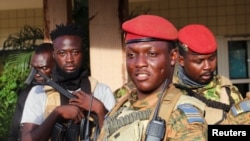Ghana sent its national security minister to Burkina Faso Wednesday to repair a diplomatic rift, after Ghana’s president accused Ouagadougou of hiring Russian mercenaries to fight militants.
Speaking to journalists after meeting with Burkina Faso’s interim leader, Army Captain Ibrahim Traore, Ghana’s National Security Minister Albert Kan-Dapaah said they had a frank discussion that sought to clarify what Ghanaian President Nana Akufo-Addo said in Washington.
“We have reviewed the strong cooperation between our two countries and we have clarified to our mutual satisfaction recent reported discussions between Ghana and the United States with regard to the needed partnerships for sustainable peace in the region,” he said.
Speaking at the U.S.-African Leaders Summit in Washington last week, President Akufo-Addo accused Burkina Faso of hiring mercenaries from Russia’s Wagner group and giving them revenue from a mine as payment.
Burkina Faso’s mines minister has denied the allegations.
Researchers say several African countries, including Mali and the Central African Republic, have recruited soldiers from the Wagner Group to fight insurgencies. They say Wagner, which is believed to have ties to Russia’s President Vladimir Putin, is mostly motivated by the chance to enrich itself by securing lucrative natural resources.
Mutaru Mumuni Muqthar, executive director of West Africa Center for Counter-Extremism, said Ghana’s concerns are legitimate because Russia's Wagner Group mercenaries do not have any track record of leaving sustainable peace in their areas of operations.
“We don’t think that these Wagner forces have that sense of legitimacy in terms of building structures that are sustainable to deal with the threats. We are not seeing any measures that are aimed at building local community structures and civil society and other groups that will strengthen these countries to deal with the problem on their own. We have not had any good example anywhere and so we are very worried that it will be used for other objectives and aims, especially when it comes to regime change,” he said.
In addition, Muqthar said Russia is hiding behind the operations of the Wagner Group to expand its political foothold in Africa.
“In reality, it’s an element of expansionist agenda interest in seeking to expand their interest and foothold in Africa. We are seeing that their space in Europe is shrinking and so they need to expand in other territories where they have an advantage. And they do have an advantage in West Africa in many ways because for several decades of Western engagements here a lot of people have developed some sense of fatigue. Things are not working the way they expected them to work. We’re seeing democracy retrogressing and so people are looking elsewhere,” he said.
For his part, Vincent Azumah, head of research and evaluation of the West African Network for Peace Building, said Ghana has taken a good move in order not to strain the relationship with its Francophone neighbor.
“While it is good for Ghana to raise concerns about the security of our northern borders with Burkina Faso and also to make everybody alert and to alert the world that it’s likely that this Wagner Group might want to have some incursion into Ghana, it’s also dangerous for us to now get the military elements in Burkina Faso to have some hatred for Ghana,” he said.
Ghana and Burkina Faso have generally had a steady and positive diplomatic relationship, thanks to cooperation in agriculture, water, trade, transport and security.




